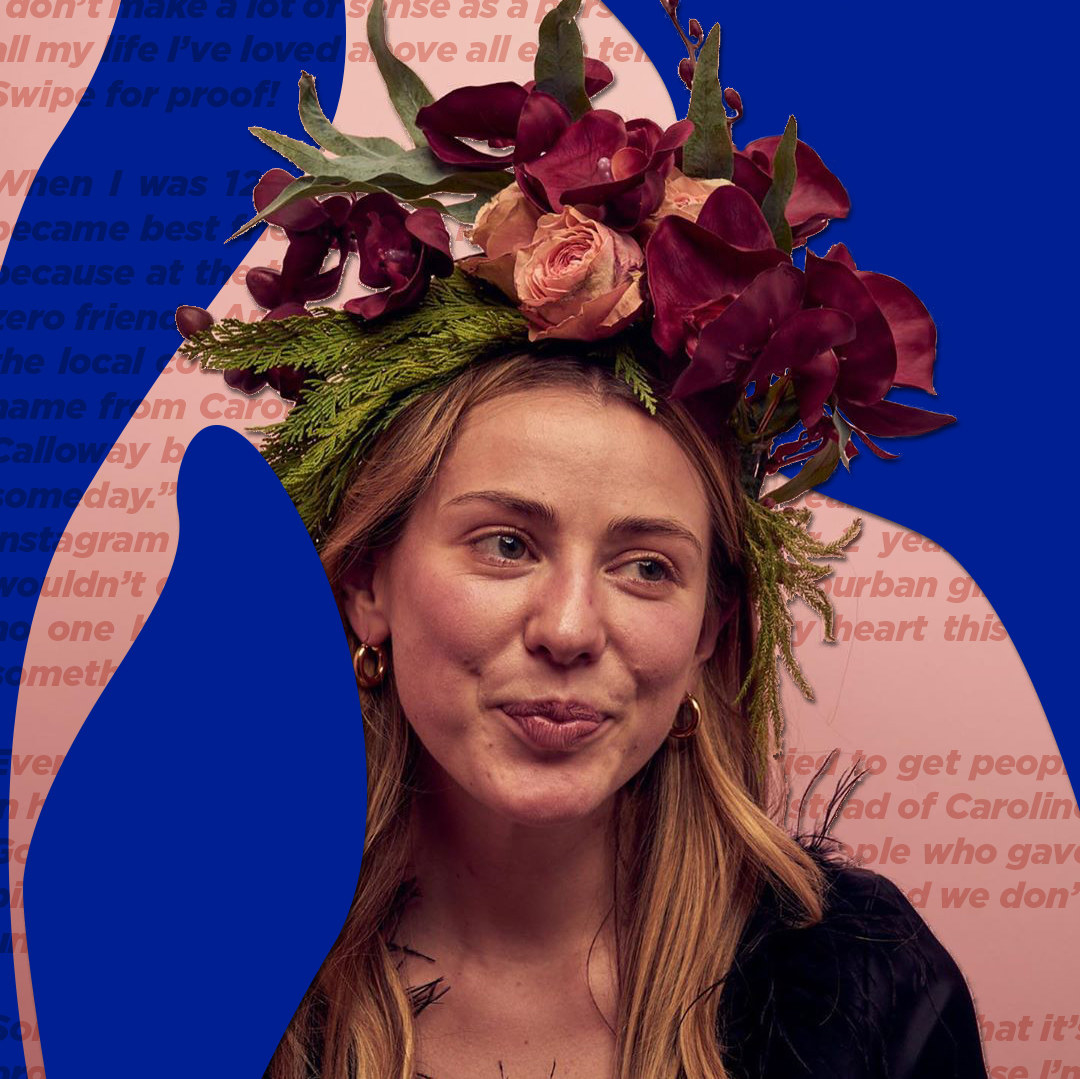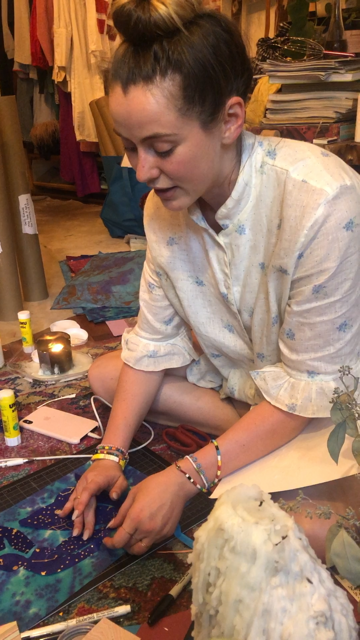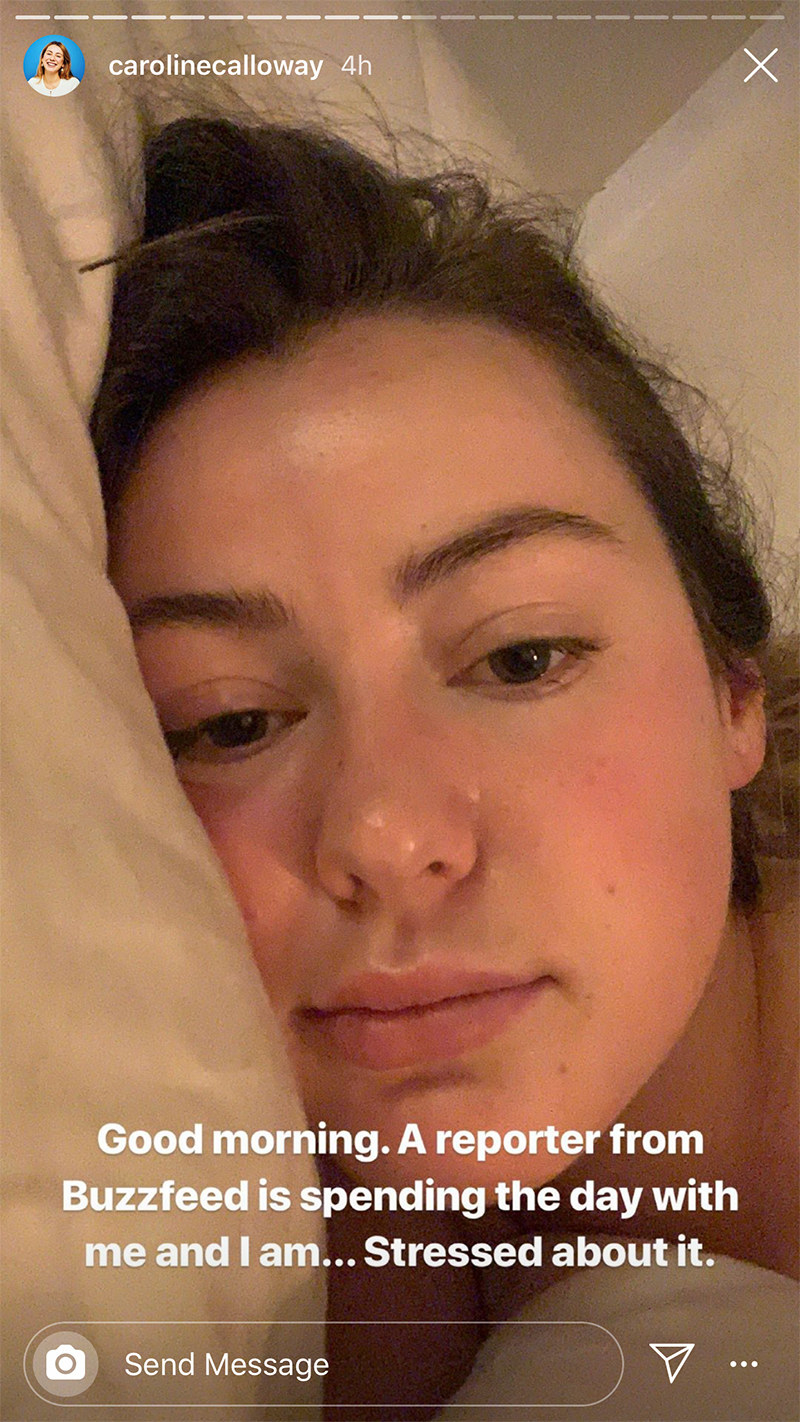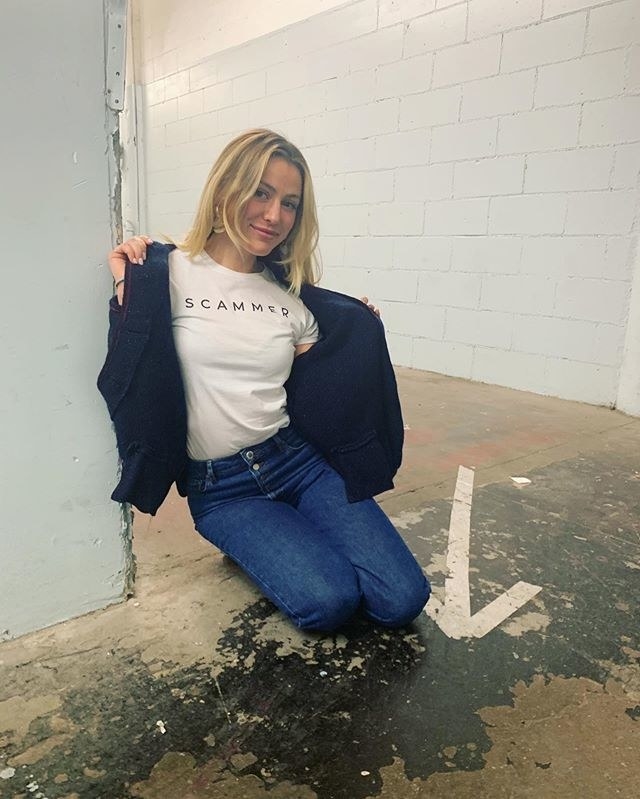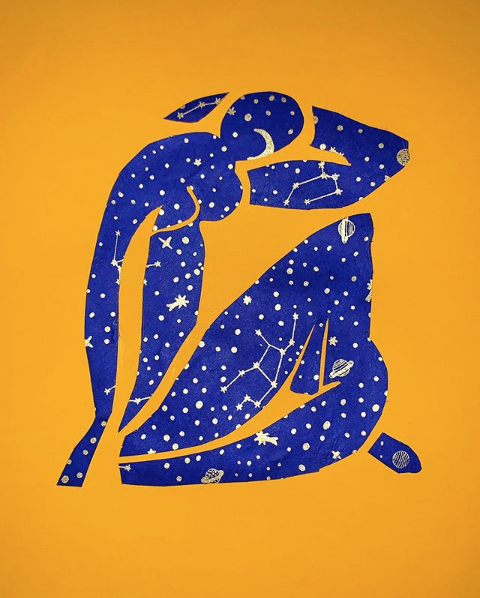Caroline Calloway has had a tough year, and she hates most of what the media has said about her. She was very anxious to meet me in her small West Village studio apartment. “I’m pretty nervous about this,” she said, in a tone both defiant and vulnerable.
Caroline, 27, dressed in pajamas with bare feet and a top knot, was settled on the floor surrounded by piles of art supplies and candles. The little floor space was filled with probably two dozen plants and piles of books. She apologized there’s nowhere for me to sit — someone from her management team was in the one hammock chair. Her 22-year-old assistant sat across from her, dutifully writing address labels for dozens of people who have bought Caroline’s art via her Instagram stories.
I booked this interview before Caroline went hugely viral for the second time this year — both times she was accused of being a scammer. She has a few things to say about that, and the criticism that she is super-privileged.
“I think that is people wanting to condemn young white girls with lots of Instagram followers,” she said. “Our culture fucking loves to hate them.”
I spent seven hours with Caroline. I watched her make art, we ate salads from Sweetgreen, and we listened to music. (We took a break when I walked her to and from her therapy session, and another when I accompanied her to a local wine shop to buy a bottle of Riesling. She never changed out of her pajamas.) It took a bit, but eventually she opened up about everything that has happened to her over the past year: how she feels about her ex-friend Natalie Beach writing a tell-all essay about her, her workshops, her Adderall addiction, her public persona as the face of spoiled white girl privilege, and the recent death of her father. Caroline has a lot to say about our culture and how we value the work of women, why people hate influencers so much, and why people are so obsessed with her. She just doesn’t think anyone in the mainstream media, including me, really cares to listen.
Calloway working on one of the “bbs.”
Caroline had been pretty unknown to most of the general public before this January, which coincidentally, is when she returned to New York after two years of traveling, or as she describes it, being “internationally depressed.”
“I only moved to New York nine months ago,” she said cheekily, “and I’ve been in the New York Times five times.”
That January was the first time she went viral, making international news — including at BuzzFeed News — for “scamming” fans by hosting $165 creativity workshops after a journalist’s Twitter thread went viral. After her workshops were widely mocked and she was derided as a scammer in the media, Caroline canceled some of them and refunded everyone who bought a ticket. It didn’t matter. Caroline is now frequently referred to as a grifter and a scammer, usually mentioned in the same breath as Anna Delvey, Elizabeth Holmes, and Billy McFarland. (This pisses her off. As she told me later, she never stole any money from anyone, and these people are or may soon be in jail.)
Her second viral moment was the one you know about, from a few weeks ago: Beach published an essay for the Cut describing her toxic friendship with Caroline, who she met while they were at NYU. Natalie painted Caroline as a rich, spoiled, out-of-touch grifter who abused Adderall, used her friends, and bought followers to fake her way into social media fame. (Caroline admits she bought followers initially to grow her account.) Among the titillating details, Natalie claimed she had ghostwritten many of Caroline’s famous Instagram captions and parts of a book proposal which Caroline sold for $375,000 in 2015. After Caroline withdrew from the book deal, Natalie said she was left with nothing for all of her hard work. The piece drew huge praise for Natalie’s writing, and there are reports about a Hollywood deal. Caroline herself has since signed with the talent agency UTA.
It’s clear all of the drama of the past year has gotten to Caroline. After Natalie’s piece came out, I wondered if Caroline would cancel our interview. In the first hour, she told me multiple times how nervous she was that I was there, how she hadn’t really wanted to let me shadow her, but her manager told her it would be a good idea. It was clear at first that she didn’t trust me — she chose her words carefully, and at times, her voice shook.
A still from Calloway’s Instagram story on the day of the interview.
She joked frequently about how people hate her. She has been called a liar, a sociopath, a cunt, a scammer, and has been told to kill herself. Since her father, whose mental illness she has spoken about, died earlier this month, people have been messaging her that her dad isn’t dead, she’s a liar, and chillingly, they just spoke to him — that one really gets her, she told me, because it’s so confusing in her grief.
She said she no longer cares about being liked. It’s what has empowered her to make and sell artwork on Instagram.
“What’s the worst thing they can do, call me evil?” she asked. “Oh wait, they already did.”
The pieces, which she’s selling for around $140–160 each, currently pay her rent. (She said she has never done and does not do sponcon, something she is very proud of.) Art makes her happy, as does continuing to share the long, extremely intimate captions about her life that made her famous and drew nearly 800,000 followers to her account.
Caroline’s proud of her work. She told me she built her brand strategically, tapping into content and a writing style that resonates with her audience — and maintained it for years. She believes that spending seven years building a community of almost 1 million people on Instagram has value. Her fans, who support her financially — by buying her paintings and attending her workshops — and emotionally through supportive messages, think she has value. So if the world, especially the mainstream media, thinks the brand she has built on Instagram is worthless, doesn’t that say more about them than about her?
Caroline got the most fired up when I asked: Why do you think people find you so compelling?
“Oh my god, I fucking hate this question,” she told me. “It just really speaks to our willingness to discount the value of free digital content. No one is asking Taylor Swift, ‘So like, why your songs? Why do you think people love them?’ People understand that she makes things people want on purpose. I make things people want on purpose, and yet I get asked again and again, ‘Why do you think people love reading your stuff? Why you? Why has this worked?’ And it’s like, fuck you! The stuff I make has value, and that value is not there by accident. I make stuff that is deceptively smart, that is emotionally addictive. I worked very hard to craft a writing voice that is so easy to swallow and goes down so easy on the throat that you blink and 20 minutes have passed and you’ve been binge-reading my captions. I didn’t provide that by accident.”
That brings us to the question: Is Caroline a scammer? In her mind, a better question might be: Why has the world decided the workshops she provided were a scam? As she pointed out, although the workshops were roundly mocked in the media, the attendees who were interviewed had positive things to say. She said that she refunded everyone, even the ones who attended — and that many sent her the money back after they attended the workshop. To them, their hours with Caroline were worth the money. Is that a scam?
Maybe, Caroline said, it’s more of a reflection on how our culture treats women, or “our quickness to which we devalue [women’s] time.” Plus, she said, our culture hates influencers, who happen to be mostly white women. These content creators are constantly told what they do has no value to the world, that they are scammers, that the art of Instagram is worthless, despite the fact it is consumed by millions.
Caroline thinks this hatred stems from the feeling you get when you scroll through your feed.
“It makes you feel angry and bad and sad, and we don’t have any language for this experience,” she said. “I think we really are sort of, like, bloodletting that feeling collectively by hating influencers, because we don’t have a better way to articulate our distaste for the way they make us feel in the quiet moments with our screens.”
If you follow the Twitter snark on Caroline Calloway, you probably think she was with a silver spoon in her mouth, your typical rich white girl. The truth, Caroline told me, like most things you read on Twitter, is a little more nuanced than that.
In her piece, Natalie cast Caroline as the rich swan to her struggling, working-class ugly duckling. Caroline said this characterization was a “very smart narrative device” and that she thought Natalie “cast herself as having less privilege” than she actually does. (We reached out to Natalie for comment.)
The truth is, Caroline said, she is privileged compared to many, but she’s not a spoiled rich girl with a trust fund. She grew up in Falls Church, Virginia, an only child. Her mom works for the department of transportation, and her dad worked as a corporate lawyer before he became unable to work due to his illness. They divorced when she was young.
Caroline said her parents poured all of their financial resources into her education, working hard to send her to boarding school at Exeter. She said this sacrifice her parents made is the reason she wouldn’t necessarily consider herself strictly middle-class — “because my parents…made nothing off-limits to me in terms of education.”
“My emotional burden was definitely lightened during that time by knowing [that],” she said. “If I achieved access to that education, my parents would provide it for me.”
Caroline is often derided as an example of squandered white privilege. She said she thinks this is an unfortunate side effect of white people becoming more cognizant of their own privilege.
“I think it’s really tempting to take that education and kind of virtue signal that you understand the concepts of privilege by pointing it out and condemning it when you see it,” she said. Caroline knows she has benefitted from white privilege, “but I also don’t think I’m the poster child of privilege.”
The public perception of Caroline as a rich girl also has to do with the fact she faked it a little herself, especially when she transferred to Cambridge.
“I think it’s in ways unfair that I’m categorized as a rich girl, but I also have a lot of compassion for why people see me that way because our culture really fetishizes that and I of all people have really cashed in on that fetishization,” she said. “So I don’t begrudge anyone for not taking the time to look into my story more.”
Caroline poured all of this effort into her Instagram because she saw it as a way to get herself a book deal. Her first post was on June 5, 2012, and at first she mostly posted about traveling using the hashtag #adventuregrams. Once she transferred to Cambridge after a year and a half at NYU, she had a hunch American women and girls would like to see the adventures of a young woman in the storied halls of one of England’s oldest institutions. After all, she had grown up obsessed with Harry Potter, and she knew many Americans loved learning about British culture. She set herself apart by writing long, detailed, and incredibly intimate captions. She also bought ads, which at the time were pretty cheap, and targeted them toward users who followed Harry Potter and other YA novel fan accounts. It worked, and by 2015, she had more than 500,000 followers.
Before this, Caroline admitted, Natalie helped her write her captions that developed her voice and gave her the confidence to be open online. But, Caroline insisted, everything on her account since 2013 she wrote herself — and that is when it really took off.
“I think it’s really unfair that Natalie is commonly referred to as my ghostwriter,” she said. “I think I deserve credit for what I built.” Another thing that bothers her is when people act like she never acknowledged Natalie’s work. She said she even sold the book proposal, which had Natalie’s name in it, on Etsy after her book was canceled.
In 2015, while Caroline was still at Cambridge, she and Natalie worked together to write the proposal for a memoir of Caroline’s life titled And We Were Like. Natalie told the Cut that she came on as a ghostwriter for a 35% cut and the book sold to Flatiron Books for $375,000. Unfortunately, Caroline said, this coincided with her descent into amphetamine addiction, specifically Adderall.
Like many people, Caroline said she had two best friends: one from high school, Kelsey, and one from college, Natalie. They were the two friends who were affected by her addiction the most, and she described herself as a “selfish, shitty friend.” Her relationship with Kelsey survived her addiction and they are still close. The one with Natalie did not.
“My experience was that I really hurt the people close to me and sort of kept up appearances with people who weren’t as close to me,” she said.
It’s because of this that Caroline does not begrudge Natalie for sharing her story and insisted she is genuinely happy for her success.
“She suffered all of the consequences of being the best friend of an addict and never got to know the woman that recovery made me into,” she said. “And so I think her perception of me at that time is very valid, especially in her characterization of me as a toxic person, because I was.”
She didn’t want to go into much more detail about the allegations in Natalie’s piece, because she is planning on writing her own essay about their friendship. And yes, that includes the Yale plates.
In 2017, in the throes of her Adderall addiction, Caroline backed out of her book deal. She posted about it on Instagram and then more or less vanished for two years, during her “international depression” after she graduated from Cambridge. She posted sporadically on Instagram, and over time lost around 70,000 followers. She recovered and moved back to New York. She said she felt better than she ever had and was in a great space mentally.
She started working on her Instagram again. She needed money and didn’t want to do sponcon. Instead, she came up with the idea for creativity workshops, where her followers could come chill with her, learn about writing, eat salad with her, learn about building a brand on Instagram, and share some of their own writing or art. She envisioned it as a very niche event, for people who had followed her for years, the only people who would really “get it.”
You know how this story ends. The workshops went viral, criticized as a scam — which at the time, was a very hot buzzword during the 2018 “summer of scam.” Many headlines at the time, including ours at BuzzFeed News, compared Caroline’s workshops to the “Fyre Festival.” People watched with bated breath as Caroline’s admitted disorganization and poor planning for the event — like the widely mocked accidental ordering of 1,200 mason jars to her apartment — happened in real time.
“I don’t think many people can remember the moment when they lost control of their own story,” she said.
Hearing Caroline talk about how her workshop was derided in the media, it was easy to understand why she was nervous to meet me. She doesn’t have a good track record with media coverage. She spoke in particular about a writer for New York’s Intelligencer, who she said wrote “the meanest article” about her workshop, but was nice to her face.
“Her coverage of my story ended the day she turned that piece in and she went live,” she said. “The way that her article affects my life, and the way that my life was affected by New York magazine, backing the concept of people hating me and giving people the OK to publicly think I’m uncool…I have to deal with the consequences of that every day.”
Interestingly, in that same piece, one of the attendees is quoted as saying that Caroline “may not be a teacher, but she’s definitely not a scammer.” In fact, Intelligencer reported none of the attendees felt they had been scammed. The attendee said she made friends at the event, something Caroline told me as well. She told me she knew of a group of girls who went on a trip together after meeting at the workshop. Attendees told BuzzFeed News similar things at the time as well, with one saying she had “messaged [Caroline] on several platforms telling her that I wanted her to keep my money because the workshop was everything I, personally, had hoped for.”
(“Caroline Calloway sought out Madison and invited her to attend the workshop as a member of the press,” a spokesperson for Intelligencer said. “Calloway later shared the piece on her Instagram page following publication.”)
One of the girls who had positive experiences at the workshop was her now part-time assistant. She told me she had a great time attending Caroline’s August workshop, named the Scam as a nod to her haters. She is now helping Caroline manage the sales of her “bbs” — which is what Caroline calls her artwork.
The entire time we were talking, Caroline was working on this artwork, gluing the pieces together and making bookmarks to go in the packages. Here’s another common question: Is Caroline actually selling this art — which is either inspired by or ripped off from Matisse depending on your view — she makes on her floor with materials from a craft store?
It seems she is. There were at least 20 paintings packaged up for sale by the end of the day. Caroline proudly showed me they were headed all over the world: Amsterdam, Norway, Oklahoma City, and right down the street in NYC. She told me she’s currently selling enough of her artwork to support herself, but it’s not making her rich (as she told me, she can’t afford right now to fix her air conditioner so she’s just hoping fall weather comes soon).
Caroline told me she makes her pieces with simple products because that’s kind of the point. The people who are buying her artwork are buying it because she made it. They value her as an influencer, and the art is worth the money they pay because of that. Is that a scam?
During our seven hours together, Caroline told me repeatedly that she is happy. She has created a life she enjoys, in her eccentric apartment surrounded by plants, candles, and books making art. She is supporting herself creatively. She is currently working on turning her life story into a book series, which she refers to as “serialized memoirs,” starting when she was 18. Eventually, she would like to get her PhD in Art History at NYU.
As I prepared to leave, I asked Caroline if she thought we had a good talk. She told me no; she still didn’t trust me. She then openly began speculating about what from our interview I could twist to make her look the worst. She later posted something on Instagram to the same effect.
When I got home, I checked out a Reddit forum where Caroline is gossiped about almost continuously, to see what people were talking about today. Not only was our day being dissected, but I was too. Someone wrote how gross it was I seemed to have my shoes on the bed in one of her snaps. (“My feet were not on the bed — it’s just the angle!” I grumbled to my cat as I scrolled.) There was a discussion about how I was “thirsty” because I had clearly “asked” to be verified on Instagram, where I don’t have many followers. (“This is ridiculous!” I fumed to my husband as I scrolled while cooking dinner. “I never asked to be verified on Instagram! That’s not how it even works!” He rolled his eyes and told me to get offline.)
Clearly, I don’t have as thick of skin as Caroline. Before I left, I asked her why she thinks she hasn’t been totally crushed by all the hate toward her, and she told me she was. That’s why she refunded the workshop fees. She felt “crushed,” guilty and greedy for expecting people would pay to listen to what she had to say.
“If that had made people like me, then maybe I would have stuck with that because it is nice to be liked and it sucks to be disliked and even though I have a much better toolbox for handling this pressure, I definitely still care,” she said.
Right now, she’s determined to trust people and live her life the way she wants, without engaging in “naivety to the point of stupidity.”
“The worst thing I could do now is live my life expecting people to betray me at every turn,” she said.
Even though Caroline didn’t trust me, she still gave me gifts as I left: one of her bbs (signed) and a plant in one of her infamous mason jars. She explained that giving gifts is her love language.
Caroline told me she had the perfect way for me to end this article. She has been giving so many mason-jar plants away, that she is quickly running out of the containers she bought for her workshop.
She said, “I may need to order more!” ●
- Who Is Caroline Calloway And Why Is Everyone Talking About Her? Let Us Explain.Stephanie McNeal · Sept. 11, 2019
- People Said This Instagram Influencer’s “Tour” Was Fyre Fest 2. Here’s Her Side Of The Story.Katie Notopoulos · Jan. 15, 2019
Stephanie McNeal is a social news editor for BuzzFeed News and is based in New York.
Contact Stephanie McNeal at [email protected].
Got a confidential tip? Submit it here.
Source: Read Full Article
